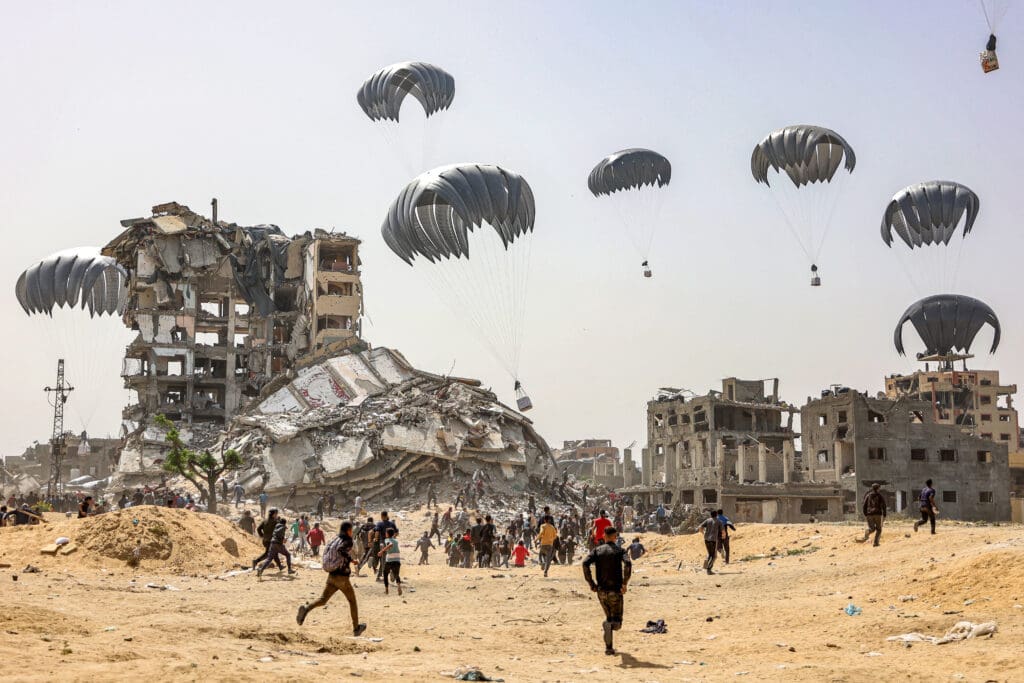For more than a year, Palestinians have faced a systematic and relentless assault on their homeland, amounting to the most profound crisis since the Nakba of 1948. Following the events of October 7, 2023, Israel has embarked on a genocidal campaign against the population of the Gaza Strip and stepped up its repression in the West Bank, pushing Palestinians into an unprecedented state of suffering and displacement while it tightens its grip over the territory. What has unfolded is not just another cycle of violence, but a multi-faceted catastrophe that threatens the very fabric of Palestinian life.
Amid this profound crisis, there has been an astonishing absence of Palestinian leadership. The Palestine Liberation Organization (PLO), the internationally recognized representative of the Palestinian people, has been conspicuously silent. Mahmoud Abbas, the PLO’s chairman and the president of the Palestinian Authority (PA), has remained largely invisible, appearing only occasionally at international forums such as the United Nations General Assembly or the Arab League Summit. Even when doing so, he has failed to leverage these platforms to rally global support. He has not addressed the UN Security Council to demand that it protect his people, nor has he spoken at the International Court of Justice. In stark contrast with Ukraine’s Volodymyr Zelensky, who has traveled tirelessly to garner international support, Abbas has failed to advocate for the Palestinian cause on the global stage. Remarkably, he has not even set foot in Gaza, a territory he nominally claims to represent, unlike numerous aid workers and doctors who have risked—or paid with—their lives to provide assistance on the ground.
Hamas, which had governed Gaza prior to October 7 but is not part of the PLO, is also struggling to provide any effective leadership. While its members in the besieged territory fight for survival, its political leaders based in Qatar were, until recently, mainly engaged in fruitless ceasefire negotiations and managing the fallout from the decision to attack Israel. The organization’s leaders have been assassinated in various capitals across the Middle East, further diminishing its ability to operate effectively. Hamas has long been ostracized by the West, particularly the United States, rendering it largely incapable of using diplomacy to achieve its aims. Despite growing support among otherwise defenseless Palestinians for its armed resistance, Hamas is only a faction and remains fundamentally unable to represent them as a unified national group, a role the PLO has historically fulfilled.
From Bad to Worse
Thirteen months on from October 7, the situation in Gaza is catastrophic. While a full accounting of the dead is impossible under constant Israeli bombardment, at least 45,000 Palestinians have been killed—most of them women and children. Experts estimate that the death toll, including indirect casualties from hunger, disease, and lack of medical care, could reach into the hundreds of thousands. More than two million people have been displaced from their homes and are facing famine, as Israel weaponizes starvation by cutting off access to essential food and supplies. Gaza’s urban landscape now lies in ruins, with entire neighborhoods wiped off the map and the territory’s critical infrastructure destroyed. In sum, Gaza is now uninhabitable—an outcome that was almost certainly Israel’s intention.
Meanwhile, the West Bank has seen an escalation of violence and repression not seen in decades. The rate of Palestinian deaths is at its highest level in 20 years, and Jewish settlers have intensified their attacks to an unprecedented degree. Israel has expropriated more territory than at any time since the Oslo Accords were signed in 1993. Entire Palestinian communities have been displaced, as settlers, emboldened by a sense of impunity, attack villages in full view of—and with support from—Israeli authorities.
In service of its agenda of annexation, the Israeli government has ramped up its military campaign in the northern West Bank, particularly around cities like Jenin, Nablus and Tulkarem. The Israeli army has sought to dismantle armed resistance networks, using overwhelming force and collectively punishing entire communities. This has involved raids on refugee camps, mass arrests, razing infrastructure, and a near-complete lockdown of these areas, paralyzing the local economy and leaving the civilian population afraid they could suffer the same fate as Gaza. The pervasive sense of dread, economic paralysis, and escalating violence have made life in much of the West Bank unbearable.
Matters may only get worse after Donald Trump returns to the American presidency in January. During his first term, Trump took numerous steps in favor of Israel’s annexationists, and has already stacked his incoming cabinet with rabid supporters of the Israeli rightwing. As such, the Netanyahu government may finally feel ready to formally annex the West Bank, which will have profound consequences.
Obstacles To Rebuilding
The absence of effective leadership is not just a political problem—it’s a national crisis. For Palestinians to confront the existential challenges they now face, reviving a unified, representative leadership is paramount. Since the 2007 political rupture between the Fatah-led PA and Hamas in Gaza, Palestinian political life has stagnated and grown increasingly dysfunctional. The lack of elections and democratic legitimacy has allowed those in power to become more authoritarian, corrupt, and disconnected from the people they are meant to represent. With no clear vision, strategy, or mandate from the people, the leadership’s response to Israel’s onslaught has been feeble and disorganized.
Over the past 17 years, numerous attempts have been made to bridge the political divide, but all have failed. Each side has prioritized maintaining control over its respective territory—Fatah in the West Bank and Hamas in Gaza—rather than ceding any ground or pursuing genuine reconciliation. External pressures from the U.S., European Union and Israel have also played a significant role in preventing unity, as they view a reconciled Palestinian leadership as a potential threat to the existing balance of power. These actors have discouraged any efforts toward elections or power-sharing arrangements, ensuring the political stagnation continues. Abbas, heavily reliant on foreign aid and Israeli consent to maintain the PA’s operations, has shown little willingness to prioritize the national interest over his own hold on power.
Despite this, recent months have seen attempts to break the deadlock. In February, Palestinian factions met in Moscow for talks, followed by another round in Beijing in April. These meetings culminated in an agreement among 14 factions in July to form a national unity government for the West Bank and Gaza, alongside plans to reform the PLO to better represent all Palestinians. Yet, behind the scenes, Abbas reportedly dismissed the agreement, and since then, little progress has been made toward implementing these steps. This failure underscores the extent to which internal divisions and vested interests continue to hinder any meaningful attempt to rebuild Palestinian political institutions.
Grassroots initiatives have also emerged, aiming to resuscitate and restructure the PLO independently of the current leadership. A notable effort came out of a Palestinian-led conference held in Doha in January 2023, where side conversations among some participants led to an initiative aimed at organizing a national conference to reconstitute the PLO. However, as momentum picked up after October 7, 2023, Abbas denounced the initiative as a foreign plot, making it difficult for organizers to find a venue, as regional countries were hesitant to appear to be interfering in internal Palestinian affairs. Other grassroots movements have faced similar challenges, hampered by divisions over whether to work within existing institutions or create new ones from scratch.
The result of this leadership vacuum has been devastating. Palestinians have been left without a unified voice to advocate for them on the international stage. The Ramallah-based leadership’s apparent strategy—avoid provoking Israel’s wrath in hope of avoiding Gaza’s fate—has done little to protect Palestinians in the West Bank or advance their struggle. Without effective representation, or international journalists allowed into Gaza, Palestinians there have become their own best advocates, using social media to document their hellish reality and expose Israel’s war crimes. Their efforts have garnered global attention and sympathy, but they lack the organized, strategic political leadership necessary to leverage this support for concrete change.
Building on Support
Despite this, and their leadership’s failings, Palestinians have had some successes on the diplomatic front. The PLO’s 2011 campaign for formal UN statehood recognition opened new avenues for international legal action, such as the recent ICJ ruling on the illegality of Israel’s occupation. However, this process has been slow and subject to intense pressure from the U.S. and Israel, both within the UN and in the occupied territories. As a result, the Palestinians have often needed third parties to seize opportunities in the international arena on their behalf, like South Africa’s genocide case at the ICJ.
Yet it is clear that Palestinian national identity is stronger than ever, and support for Palestinian self-determination enjoys unprecedented global support. Overwhelming recognition of Palestinian statehood at the UNGA, the ICJ’s recent advisory opinion clarifying that Israel’s occupation and apartheid regime are illegal, and a General Assembly resolution calling for it to be dismantled within a year, are political and diplomatic tools that the Palestinians can use to counter Israel’s annexationist agenda and advance Palestinian self-determination.
For the time being, however, the Palestinian national movement is rudderless, disorganized and unable to respond effectively to its greatest challenge in decades. Between the crisis at hand and the opportunity ahead, it is more urgent than ever that Palestinians forge a new, unified national leadership. Without one, they will struggle to rally international support, pursue diplomatic opportunities, or chart a new path toward liberation.


